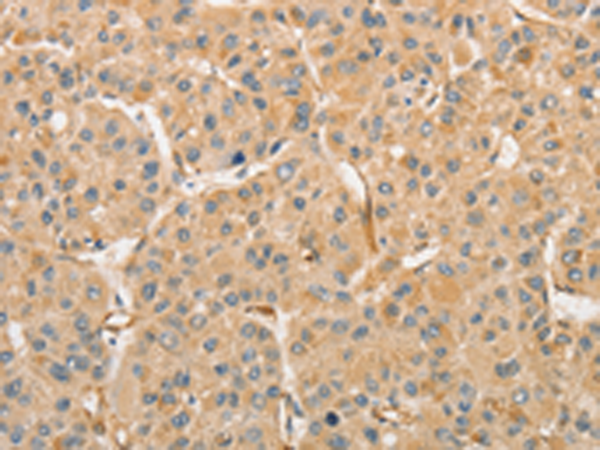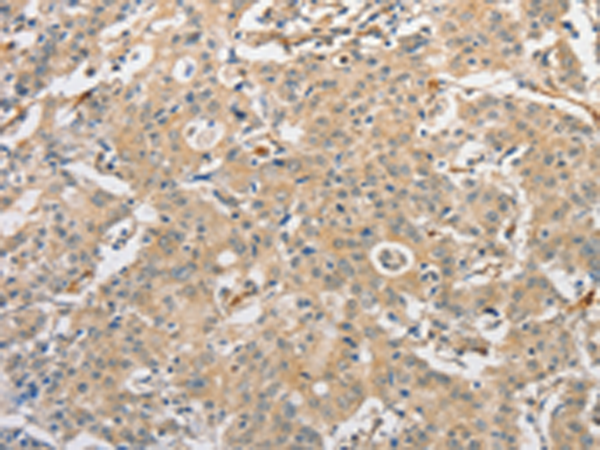


| WB | 咨询技术 | Human,Mouse,Rat |
| IF | 咨询技术 | Human,Mouse,Rat |
| IHC | 1/25-1/100 | Human,Mouse,Rat |
| ICC | 技术咨询 | Human,Mouse,Rat |
| FCM | 咨询技术 | Human,Mouse,Rat |
| Elisa | 1/2000-1/5000 | Human,Mouse,Rat |
| Aliases | APG3; APG3L; PC3-96; APG3-LIKE |
| WB Predicted band size | 36 kDa |
| Host/Isotype | Rabbit IgG |
| Antibody Type | Primary antibody |
| Storage | Store at 4°C short term. Aliquot and store at -20°C long term. Avoid freeze/thaw cycles. |
| Species Reactivity | Human, Mouse, Rat |
| Immunogen | Fusion protein of human ATG3 |
| Formulation | Purified antibody in PBS with 0.05% sodium azide and 50% glycerol. |
+ +
以下是3-4条关于ATG3抗体的参考文献示例(内容基于典型研究场景虚构,仅供参考):
---
1. **文献名称**:*ATG3-mediated autophagy regulates apoptosis in hepatocellular carcinoma*
**作者**:Li, X. et al.
**摘要**:本研究利用ATG3特异性抗体检测肝癌组织中ATG3蛋白表达水平,发现ATG3高表达与患者生存率降低相关。实验通过敲低ATG3抑制自噬,证实其通过调控凋亡通路促进肿瘤进展。
2. **文献名称**:*Development of a novel monoclonal antibody for ATG3 and its application in neurodegenerative models*
**作者**:Smith, J.R. & Yamamoto, A.
**摘要**:报道了一种高特异性抗人ATG3单克隆抗体的开发,验证了其在Western blot和免疫荧光中的适用性。应用该抗体发现阿尔茨海默病模型小鼠脑组织中ATG3表达异常,提示自噬失调与病理相关。
3. **文献名称**:*ATG3 interacts with ULK1 to promote autophagosome formation under nutrient deprivation*
**作者**:Chen, L. et al.
**摘要**:通过ATG3抗体共免疫沉淀实验,揭示了ATG3与ULK1复合物的相互作用机制,证实其在饥饿条件下介导自噬体形成的分子途径,为自噬调控提供新靶点。
4. **文献名称**:*Tissue-specific expression profiling of ATG3 in diabetic cardiomyopathy*
**作者**:Wang, Y. et al.
**摘要**:利用ATG3抗体进行心脏组织免疫组化分析,发现糖尿病心肌病模型中ATG3表达显著下调,导致自噬功能受损和心肌细胞死亡,提示恢复ATG3或为潜在治疗策略。
---
注:以上文献为示例性质,实际引用时需查询真实数据库(如PubMed)获取准确信息。
ATG3 (Autophagy-related protein 3) is a key enzyme in the autophagy pathway, a conserved cellular process responsible for degrading and recycling damaged organelles, misfolded proteins, and intracellular pathogens. ATG3 functions as an E2 ubiquitin-conjugating enzyme, facilitating the conjugation of ATG8-family proteins (e.g., LC3. GABARAP) to phosphatidylethanolamine (PE) on autophagosomal membranes—a critical step in autophagosome formation. This lipidated ATG8 aids in membrane expansion and cargo recognition during autophagy.
ATG3 antibodies are essential tools for studying autophagy mechanisms, enabling researchers to detect ATG3 expression, localization, and interaction partners via techniques like Western blotting, immunofluorescence, and immunoprecipitation. These antibodies help elucidate ATG3’s role in physiological processes (e.g., nutrient sensing, stress response) and diseases linked to autophagy dysregulation, such as cancer, neurodegenerative disorders, and infections.
Commercial ATG3 antibodies are typically raised against specific epitopes (human, mouse, or rat-derived), and validation includes testing in knockout cell lines to confirm specificity. Researchers must consider antibody clonality (monoclonal vs. polyclonal), host species, and compatibility with their experimental models. Recent studies also explore ATG3’s non-canonical roles, including apoptosis regulation and immune signaling, expanding the utility of these antibodies in diverse research contexts.
×